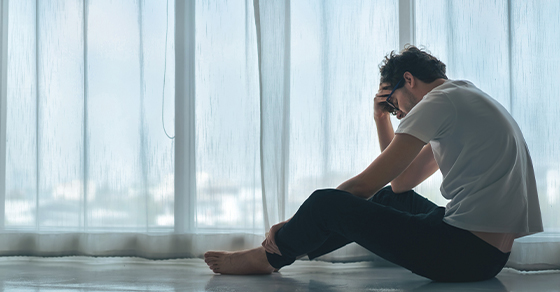
The Truth About Slipping Up in Recovery
It happens more often than you might believe. Does this sound familiar? You’ve taken the difficult step of seeking help, begun treatment, and perhaps even started to feel like yourself again. Then, something happened, and you slipped; you used again.
Please remember, you are not alone in this.
More importantly, it does not mean you have failed.
Relapse Is Common – But Misunderstood
We hear the word “relapse” and immediately think something went wrong. And yes, it’s a setback. But it’s not rare, and it’s not proof that treatment didn’t work.
Statistics say that 40 to 60% of people relapse after treatment for substance use disorders. That’s the same range as other chronic conditions like asthma, diabetes, or hypertension.
You wouldn’t say someone with high blood pressure “failed” if their symptoms returned.
So why do we treat addiction relapse like a personal failure?

Why Relapse Happens (Even When You’re Doing Everything Right)
Relapse is a gradual process that often unfolds quietly. Long before a person resumes their old habits, they may experience a buildup of negative thoughts, shifts in their daily routines, and increasing stress levels that go unnoticed.
This internal struggle can create a perfect storm, leading to a moment of vulnerability where the temptation to relapse becomes overwhelming. Understanding the subtle warning signs that precede relapse is crucial for preventing it and maintaining long-term recovery.
Here are some real, human reasons people relapse:
-
Unresolved trauma or emotional pain – The deeper roots of addiction often need more than just short-term treatment.
-
Mental health struggles – Depression, anxiety, PTSD, or ADHD can resurface and feel overwhelming.
-
Lack of ongoing support – Addiction Recovery isn’t just 30 days and done. Without continuing care or a support network, it’s easy to feel alone.
-
Stress and life pressure – Work, relationships, finances — life doesn’t pause just because you’re trying to get better.
-
Environmental triggers – People, places, or habits tied to substance use can creep back in, especially if you’re not in a structured space.
None of these are moral failings. They’re conditions. Circumstances. Parts of life.
And they can all be addressed with the right kind of help.
The thing about curing an addiction is that it has to address so much more in your life than just the substance use.
The Shame Spiral: What Hurts More Than the Relapse Itself
After a relapse, one of the hardest things to face isn’t the substance itself — it’s the shame that comes with it. You may feel guilt, self-loathing, or embarrassment. You might want to hide it, deny it, or pretend it never happened.
Here’s the truth: shame fuels addiction more than any drug ever could.
Beating yourself up won’t help you move forward. However, honesty, support, and self-compassion can.
It’s important to be kind to yourself, just as you would be with someone else in a similar situation.
Relapse Doesn’t Erase Your Progress
This is worth repeating: a relapse doesn’t mean everything you did before was wasted.
You learned something. You grew. You took steps forward. All of that still counts.
Now it’s about learning why you relapsed and adjusting the support around you so you can get back on track stronger than before.
And you should know even people who seem like they have it all relapse.
Many successful professionals, parents, artists, and high-achieving individuals struggle to stay sober the first time around. In fact, studies show that people in high-stress, high-functioning roles often delay asking for help—and when they do, they carry deep guilt if they slip up.
But addiction doesn’t care how smart, strong, or successful you are.
And relapse doesn’t cancel out your progress.
What matters most is that you keep going.
At Metamorphosis, we don’t look at relapse as failure.
We look at it as information. Clues. Insight into what wasn’t working or what needs more care.
A Better Question: What Do You Need Now?
Too often, people default to self-blame after a relapse.
You might tell yourself you’re weak, undisciplined, or beyond help — but none of that is true.
Addiction is complex, and recovery isn’t about perfection, it’s about learning what you need to stay well.
Instead of asking “Why did I mess up?”, ask:
-
What was I missing?
-
What did I need that I didn’t get?
-
Who have I been trying to do this for, and am I doing it for me?
Sometimes, relapse shows that your plan needs more structure.
Sometimes, it means trauma still needs healing.
In many cases, standard treatment doesn’t go deep enough—personalized care that’s tailored to your experience can make all the difference.
Sometimes, it means you were trying to do it alone when you needed a team.
And if that includes trying to quit cold turkey on your own, it’s important to know the risks—quitting without medical support can be dangerous and even life-threatening in some cases.
Whatever the answer is, it doesn’t mean you’re back at zero.
You’re further along than you think.
How to Move Forward After a Relapse
It starts with one choice: don’t go back into hiding.
Reach out. Talk to someone. Get honest with yourself — and with people who want to see you win.
Here’s what helps:
-
Reconnect with professional support – A relapse may mean you need to re-enter treatment or adjust your recovery plan. Contact us to explore your options.
-
Lean into community – Whether it’s a therapist, sponsor, recovery group, or your support circle—use them. Don’t isolate.
-
Focus on the “why,” not just the “what” – What stress, pain, or thought patterns led up to the relapse? That’s where the real work lives.
Final Thought: You’re Still In This
Experiencing a relapse does not indicate that you are broken or that you lack strength.
It certainly doesn’t mean that your journey is over.
Instead, it reflects the fact that you are a person who is working to learn new ways of living, and this is a process that requires time, patience, and understanding.
If you find yourself having slipped back into old habits, it’s important to remember that this is a common part of the journey.
What truly matters is how you respond to that slip.
Reflect on what led to it and use it as an opportunity for growth.
You don’t have to navigate this path alone.
There are resources, support systems, and individuals who care about you and are willing to help you through this phase.
Embrace the support available to you as you continue to strive for a healthier, more fulfilling life.
Key Takeaways:
-
Relapse affects 40–60% of people after addiction treatment just like other chronic conditions.
-
It doesn’t mean treatment failed it means something still needs support.
-
Common causes include stress, trauma, mental health struggles, and lack of continued care.
-
Shame after relapse can do more harm than the relapse itself.
-
You’re still in recovery. What you do next matters more than what happened.




